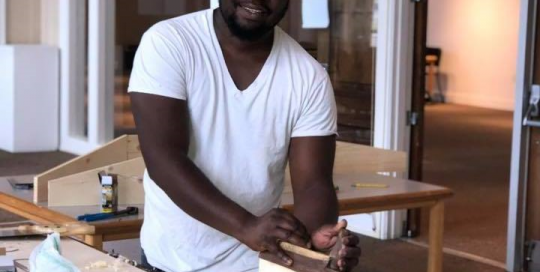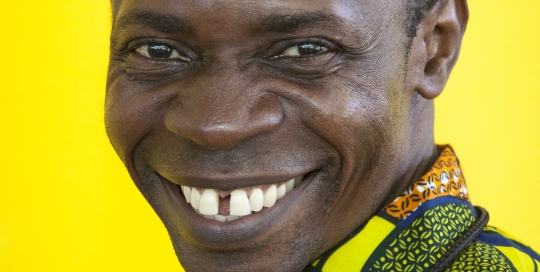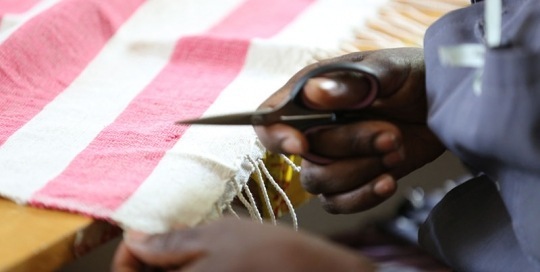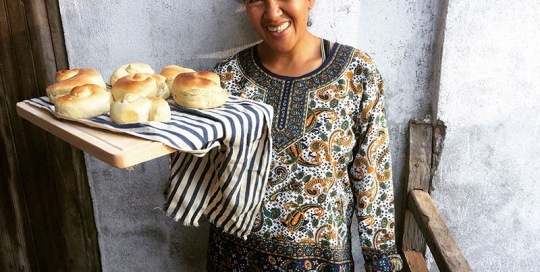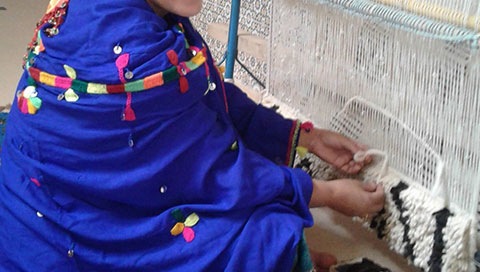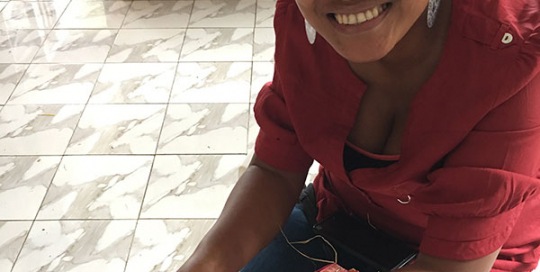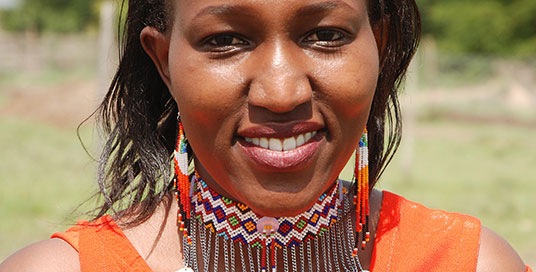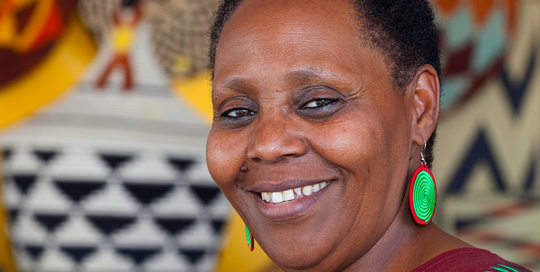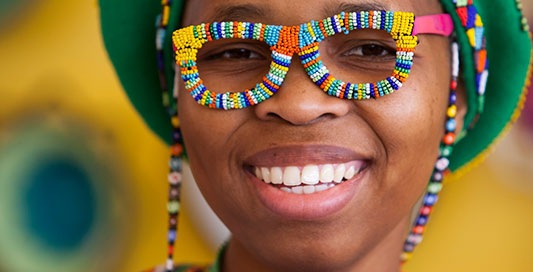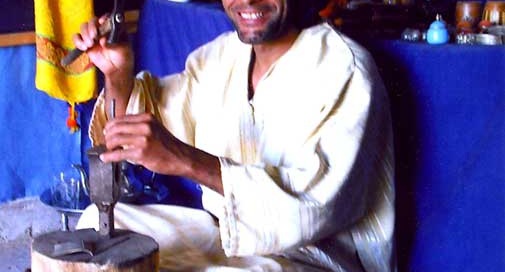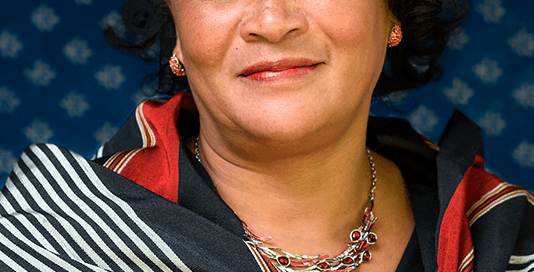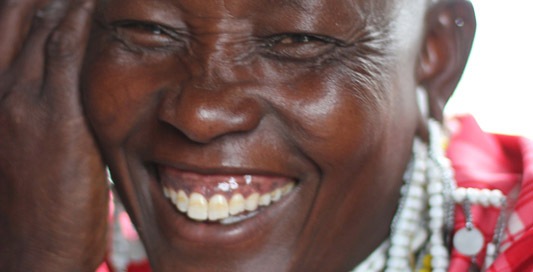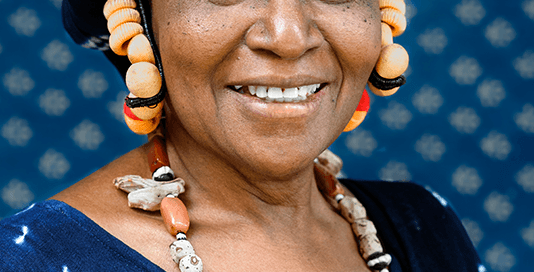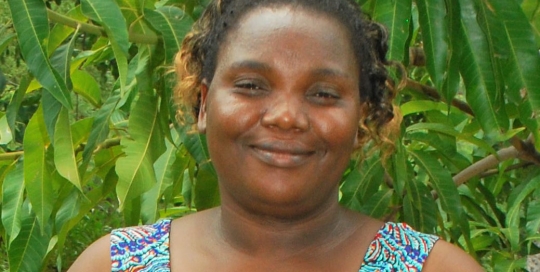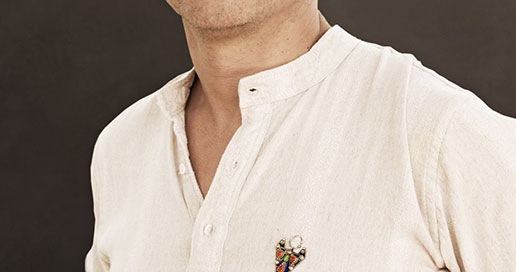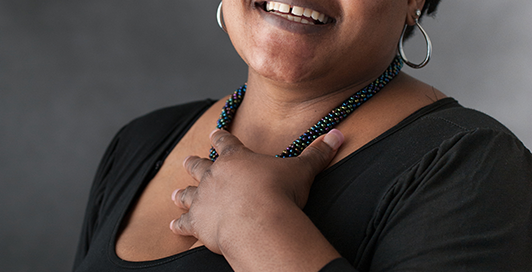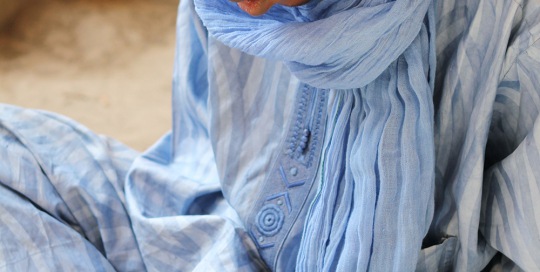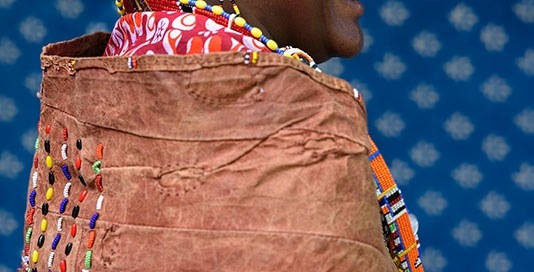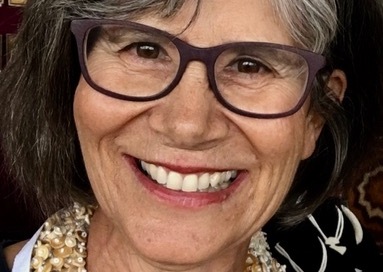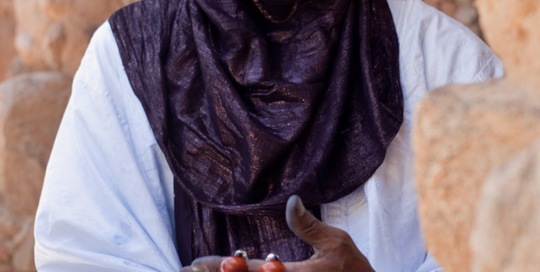Design coffins are an innovation of Kane Kwei, who made the first design coffin in 1951. Originally meant as a palanquin for a chief, it was turned into a burial coffin when the chief died before it could be completed. The design coffin soon became a burial tradition among the Ga people of Ghana. Eric […]
Nomoda Ebenezer Djaba
Africa
In the Krobo region of Ghana, strands of colorful glass beads are worn in everyday life, as well as to celebrate special occasions. Ghanaian bead-maker Nomoda Ebenezer Djaba (known as “Cedi” for short), began designing powder glass beads at the tender age of seven; precocious, certainly, but also brave, since traditionally, Ghanaian bead artisans are […]
Sabahar
Africa
A land of otherworldly beauty that for centuries was renowned as an international center of knowledge, Ethiopia has faced devastating economic hardships for decades. Aiming to alleviate some of that hardship is artist collective Sabahar, which expands upon Ethiopia’s storied tradition of weaving whisper-soft cotton products on hand looms. Sabahar was actually started by a […]
Prisca Marie Ramanaliniaina
Africa
For Prisca Marie Ramanaliniaina and the artist collective she runs, Association Tanjona, raw silks native to their island represent textile traditions that go back beyond memory. They play a role in honoring ancestors, even as they represent 21st century beauty and opportunity. The fibers are soft and nubbly, a testament to the natural beauty of […]
Fatima and Khira Ouaderrou
Africa
For generations, women in the rural southeastern province of Errachidia, Morocco, have made exquisite textiles. Today, sisters Fatima and Khira Ouaderrou maintain and expand upon this tradition with their boucherouite carpets. Boucherouite refers to a rugs specific to the region, which are knotted from recycled fabric. The knowledge of this intricate process was passed down […]
Lalaina Raharindimby
Africa
One example of Madagascar’s incredible biodiversity is its many types of silk moths, found in multiple habitats throughout the island. Traditionally, wild silk cocoons are collected, spun and woven into burial shrouds in the Madagascar highlands. The cocoons spun are variable in color, iridescence and size, but not all cocoons are large and dense enough […]
Phoebe Lasoi
Africa
Massai men and women have always worn beaded jewelry, both for special occasions and for everyday use. The Kitengela Women Olmakau Cooperative community of artisans lives in Kitengela, just south of the Nairobi National Park in Kenya. Traditionally, the women meet at a home or manyatta (Maasai homestead) on a given day and work together, […]
Janet Nkubana
Africa
The female artisans of Rwanda’s Gahaya Links arguably produce some of the most recognizable items at the International Folk Art Market. Finely woven baskets, adorned with geometric patterning and vibrant, naturally dyed colors, commingle with whimsical, tall-necked woven vessels with tapering tops that seem to sway gently to the left and right. Immediately appealing for […]
ZuluGal Retro
Africa
Based in Durban, in the KwaZulu Natal region of South Africa, ZuluGal Retro was founded in 2014 by artist Nozipho Zulu. As both a creative and social enterprise, the group works with young people who have learning disabilities and special needs by equipping them with art and craft skills, enabling them to earn income from […]
Lhoucine Taous
Africa
Lhoucine is the president of the Azlag Dagger Cooperative and represents 70 artisans — the only group of its kind — following a tradition of handcrafted designs, which have been influenced by the mix of cultures in this North African kingdom. Dagger making has over 700 years of history with the Amazigh, or Berbers, in […]
Thembi Dlamini
Africa
Comprising hundreds of female artisans, many of them from rural areas of Swaziland, the Tintsaba Master Sisal Weavers collective was established in 1985 as a basket weaving business, with the purpose of holistically improving the lives of its weavers by providing them with stable income opportunities, education, and healthcare. To date, Tintsaba has engaged and […]
Marie Alexandrine Rasoanantenaina
Africa
For 35 years, artisans at the Madagascar cooperative textile organization Tahiana Creation have been producing a range of natural-fiber products. Tahiana’s founder, Marie Alexandrine Rasoanantenaina, started out by selling handmade clothing door-to-door in the 1980s; Within a few years, she was able to hire additional women to help with sewing and embroidery. As Rasoanantenaina’s business […]
Sidai Maasai Women Organization
Africa
Sidai Maasai Women’s Organization, a charitable entity that works to embolden women through community development and education, involves over fifty women in gathering materials and crafting one-of-a-kind earrings, necklaces, bracelets, and other items.
For millennia, members of Africa’s Maasai tribe have lived in Tanzania’s arid north-central region, where years of drought, overpopulation, and economic strain have […]
Aissata Namoko
Africa
Master textile artisan Aïssata Namoko of Mali first learned to sew from her mother, an accomplished seamstress, as an eight-year-old child. As Namoko continued to fine-tune her abilities as an artist, she also received a degree in accounting at college, which led to a career at Mali’s National Center of Cooperatives. She returned full time […]
Evah Mudenda
Africa
Evah’s ilala palm baskets are used for serving fruit and gathering eggs, as well as for decorative purposes. They are given as a traditional wedding gift, due to their fine beauty and practical uses. The designs used date back to the period of the Great Zimbabwe, the capital of the Kingdom of Zimbabwe, where the […]
Karim Oukid Ouksel
Africa
Master jeweler Karim Oukin Ouksel was born in the tiny Berber village of Ath Yani, Algeria; though small, Ath Yani has a centuries-old status as a producer of highly skilled artisans, who make meticulously crafted, strikingly colorful jewelry. To this day it is hailed by many as the most important region for Kabyl Berber jewelry-making […]
Jabulile Nala
Africa
South Africa is known for its breathtaking natural beauty, diverse population, and complex history. It’s understandable that a region so diverse and culturally rich is home to master artists like Jabulile Nala. Female potters of southern Africa have been renowned for their skill for over 2,000 years. Nala carries on a rich tradition of pottery-making, […]
Mohamed El Maouloud Ag Hamid
Africa
Northern Mali artist collective Timidwa was founded with the mission of bringing people together, united in common creative goals. Comprising 150 male and female artisans from different ethnicities and professions, Timidwa’s members not only support each other creatively – sharing skills and design techniques – but also socially.
Timidwa’s artisans are ethnically Tuareg, a traditionally nomadic […]
Maji Moto Maasai Women’s Project
Africa
The Maji Moto Maasai Women’s Project, located in Kenya’s Maasai Mara Reserve, is flourishing thanks to the diligent work of its all-female team of 40 master bead-working artisans.
Maasai beadwork has always been in a state of evolution, as is often the case with folk art. Just as the use of seeds, bones, leather, and stones […]
Karin le Roux
Africa
Karin le Roux is the founder Director of the Omba Arts Trust, a registered fair trade organization in Namibia that aims to support the sustainable livelihoods of marginalized communities. Representing artists from four distinct Namibian tribes, the Omba Arts Trust provides rural artisans with a means of income and creative expression. For decades, Namibia has […]
Elhadji Mohamed Koumama
Africa
For generations the Koumamas, a family of nomadic Tuareg silversmiths, traveled the Sahara selling their fine silver goods. In the 1970s, however, droughts caused the family to settle in Agadez, Niger, where master jeweler Elhadji Khoumama was born. A 25th generation silversmith, Elhadji continues the family’s long artistic tradition with his elegant, highly refined range […]
Gasali Adeyemo
Africa
Master adire artist Gasali Adeyemo creates beautiful fabric and clothing using a technique he learned in his native Nigeria. He specializes in indigo dyes because of their cultural importance to his people, and each textile has traditional Yoruba designs, with symbolic and biographical meanings. Growing up, Adeyemo’s creative inspiration was his mother, who made clothing […]

